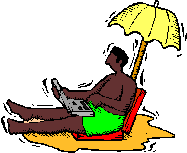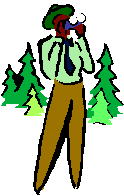 What is Information? What is Information?
Information comes to us through
our senses and helps us gain knowledge.
To gain knowledge, you have to
find the information first. There are two kinds
of information.
 Live
Information -- To find this kind of
information, your brain helps you exclude the information
you don't want from all the information swirling around you. You
can help your brain by learning how you learn. Learning to investigate,
match, classify, categorize, evaluate, generalize, apply, and reflect
using information are important ways to help you be more aware of your
surroundings. Live
Information -- To find this kind of
information, your brain helps you exclude the information
you don't want from all the information swirling around you. You
can help your brain by learning how you learn. Learning to investigate,
match, classify, categorize, evaluate, generalize, apply, and reflect
using information are important ways to help you be more aware of your
surroundings.
 Recorded
Information -- To
find this kind of information, your brain helps you investigate,
categorize, sort, select, and organize. You can help your brain with
this kind of information by learning search strategies, alphabetical and
numerical order, resources and how to evaluate recorded
information. You can also apply the strategies for learning how to
learn to using recorded information. Recorded
Information -- To
find this kind of information, your brain helps you investigate,
categorize, sort, select, and organize. You can help your brain with
this kind of information by learning search strategies, alphabetical and
numerical order, resources and how to evaluate recorded
information. You can also apply the strategies for learning how to
learn to using recorded information.
Live information is
everywhere around you at every moment.  Finding information in the real world is a process of excluding what you
don't want. That is what your brain does for you. It helps
you focus on what you want to know and excludes what you don't want.
Finding information in the real world is a process of excluding what you
don't want. That is what your brain does for you. It helps
you focus on what you want to know and excludes what you don't want.
Everything around you is included
in live information: the way the sky looks right now, the call your
friends just shouted, what your mom is doing -- this is all live
information. When a time, or event has passed, it will never be
repeated again in exactly the same way again. Your memory is your only
link to this information, unless you record it somehow.
Recorded information.
This is information that you can find somewhere in
a book, a library, a website, a video, a newspaper, a database, a cd.
This material is more permanent and is the same each time you see it
unless someone changes it in the meantime. The thing about recorded information is that once it is
recorded it needs to be stored somewhere so that we can find it to use
it again and learn from it.
meantime. The thing about recorded information is that once it is
recorded it needs to be stored somewhere so that we can find it to use
it again and learn from it.
|
 What is Information?
What is Information?